Help! Why Is My Baby Rubbing Their Face So Aggressively?
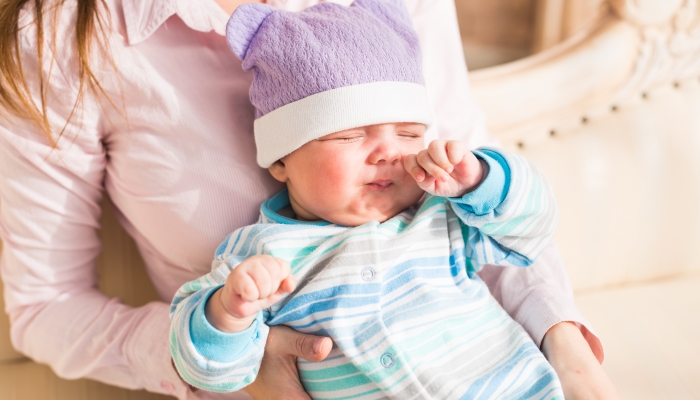
- Babies rub their faces to soothe themselves when they’re stressed or in pain.
- The most common reasons for face-rubbing behavior include teething, skin irritations, and itchy eyes.
- Babies may accidentally injure themselves when rubbing their faces.
- You can help your baby stop rubbing her face by offering teething toys and keeping their skin and eyes clean.
Babies seem to learn something new every day. From the first time they open their eyes to the first time they smile and their first baby steps, your baby is constantly showing new behaviors. While this is an exciting time for new parents, there are some things you may notice your baby doing that make you worry.
One new thing babies learn that can cause parents to worry is aggressive face rubbing. Parents may worry about their baby scratching themselves by rubbing their face with long fingernails or wonder whether they have itchy skin or eyes.
While it’s completely natural, if you see your baby aggressively rubbing their face, there are a few important things you should consider.
Common Causes of Aggressive Face Rubbing
Babies often rub their faces to self-soothe when something is making them uncomfortable. Just like adults who rub their faces when they are tired or have itchy skin, babies rub their faces to help themselves feel better.
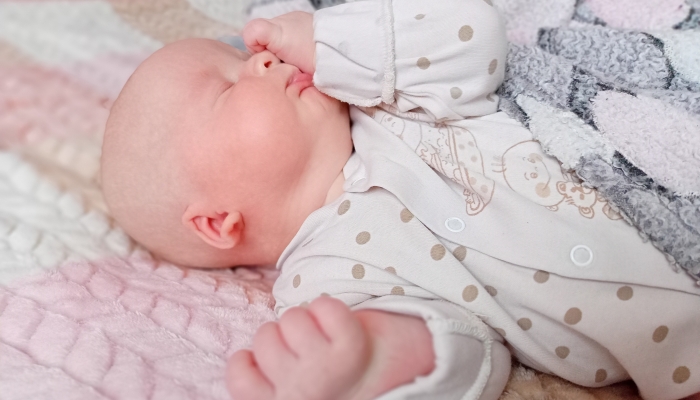
Teething
Teething is one of the most common reasons that babies begin rubbing their faces. Along with rubbing their face, Johns Hopkins11. Dawkins, R.. What You Should Know about Babies Teething. Johns Hopkins Medicine. ;. https://www.hopkinsmedicine.org/health/conditions-and-diseases/teething/what-you-should-know-about-babies-teething medical experts explain that signs of teething may include:
- Putting their own hands in their mouth
- Excessive drooling
- Fussiness
- Irritability
- Difficulty sleeping
- Low-grade fever
Skin Irritations or Allergies
Another possible reason for your baby to be rubbing her face is that she’s bothered by some kind of irritant.
Different detergents, new fabrics, and even baby soaps can dry out or bother your baby’s skin. If you notice that your little one starts to rub their face after you switch to a new brand of soap or detergent, they may have a sensitivity to the product.
There are many different types of skin irritations in babies. It can be hard to tell the difference between things like eczema and baby acne or drool rash and herpes. If you’re worried about your baby rubbing their face because of a rash, you may want to take them for a visit to your pediatrician.
Ear Infections
Ear infections frequently affect young babies and children. Experts at the Mayo Clinic22. Mayo Foundation for Medical Education and Research. Ear infection (middle ear). Mayo Clinic. 2021;. https://www.mayoclinic.org/diseases-conditions/ear-infections/symptoms-causes/syc-20351616 explain that babies may itch their ears or cheeks when they’re struggling with an ear infection.
Other signs of ear infections can include excessive crying or trouble sleeping. Most ear infections can be treated with antibiotics.
Eye Discomfort or Vision Issues
Your baby should have their vision tested during each routine visit to their pediatrician. However, some children may start to have vision problems that aren’t caught during regular check-ups. If you notice that your little one is frequently rubbing their eyes, squinting, or holding objects extremely close to their face, they may be struggling with their vision.
The American Academy of Ophthalmology33. Mukamal, R.. 10 Child Eye Problems Parents Should Never Ignore. American Academy of Ophthalmology. 2022;. https://www.aao.org/eye-health/tips-prevention/child-eye-problems-parents-should-never-ignore urges parents to seek the help of a pediatric ophthalmologist if their baby exhibits the following symptoms:
- Eye rubbing
- Squinting
- Covering or closing one eye
- Eye drainage
- Crossed eyes
- Dilated pupils
Normal Baby Behaviors and Face Rubbing
Both babies and adults rub their faces for many different reasons. While this face-rubbing behavior can indicate a problem like poor vision or skin irritation, the most probable reason is that your baby is seeking comfort.
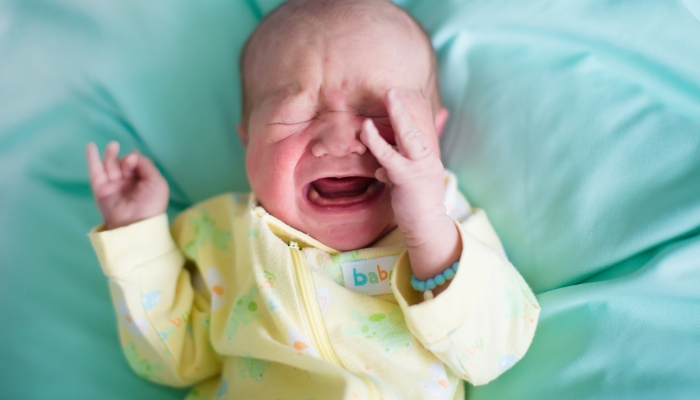
Typical Reasons for Face Rubbing in Infants
Babies who rub their face are often feeling tired, hungry, irritable, or uncomfortable. You may notice that your baby rubs their face as they fall asleep or when they are ready for a nap. However, babies may also start to rub their faces because they are exploring different textures or temperatures.
Understanding Baby’s Developmental Milestones
In addition to babies rubbing their faces to explore the world around them, you can rub your baby’s face to help them with a feeding reflex.
The rooting reflex is an involuntary motor response that helps them find food. Typically, when you rub your finger against a baby’s cheek and close to their mouth, they will turn their head towards the hand rubbing their face.
Babies typically outgrow this behavior between the ages of 4 to 6 weeks old44. Yoo H, Mihaila DM.. Rooting Reflex. In: StatPearls [Internet]. Treasure Island (FL): StatPearls Publishing. 2023;. https://www.ncbi.nlm.nih.gov/books/NBK557636.
When Face Rubbing May Be a Concern
While a baby rubbing their face against something or rubbing their face with their hands is completely normal, there are some things you should watch for.
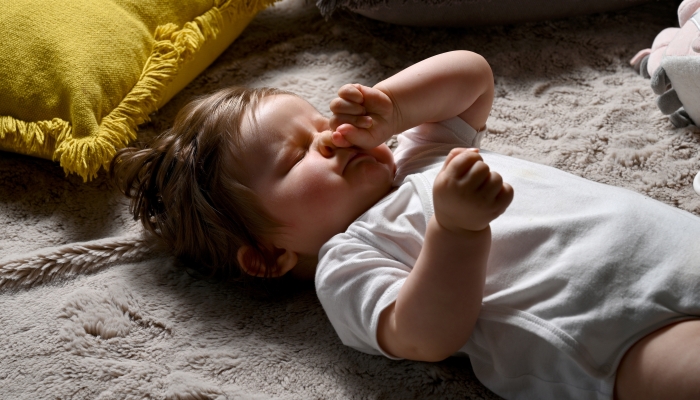
Signs of Distress or Pain
If your baby’s face-rubbing behavior is accompanied by crying, they may be in distress or having pain. Check your baby’s skin for rashes or irritation, and check their eyes for redness or drainage. In addition, your baby may start crying because they accidentally scratch themselves with a fingernail while they rub their face.
Behavioral and Neurological Considerations
Unfortunately, some babies and children rub their faces to the point of sustaining injuries. This may be due to a developmental delay or a condition like autism, where children feel a compulsion to harm themselves. If your child harms themselves due to a developmental delay, information from the Autism Research Institute55. Edelson, S., & Johnson, J. (Eds.). Causes and Interventions for Self-Injury in Autism. Autism Research Institute. 2023;. https://autism.org/causes-and-interventions-for-self-injury-in-autism may help.
Managing and Alleviating Face Rubbing
Whether it’s due to an allergy, rooting reflex, or needing to sleep, ensure that your baby’s face-rubbing behavior doesn’t cause them any skin or eye problems.
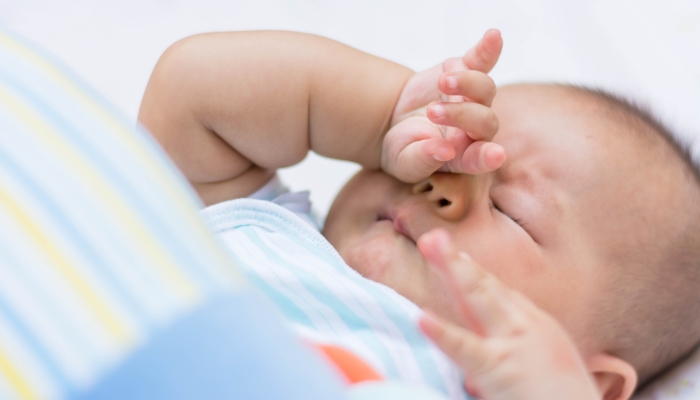
Soothing Strategies for Teething
If your baby is teething, give them some safe teething toys or a cool washcloth to chew on. You can also rub a clean finger along their gums to soothe the discomfort associated with teething.
If your baby seems uncomfortable and isn’t tolerating teething well, you may want to use a medication like Tylenol or Ibuprofen. Make sure that if you do use medication for your baby, you check the dose and concentration carefully.
Choosing Baby Safe Products
Even adults can sometimes be sensitive to specific skincare products or detergents. If you notice that your baby is rubbing their face, develops a new rash, or shows any other signs of itchy skin, you may need to choose hypoallergenic products for your household.
Some brands of soap, shampoo, lotion, and detergent may be fine for someone else’s baby but not for yours. Don’t be afraid to experiment with a few different brands until you find the one that is best for your little one.
If you can, choose unscented products that are free from artificial dyes. In addition, wash clothing and blankets with a mild detergent before you dress your baby or swaddle them in new fabrics.
Baby Skincare
Remember that babies have very sensitive skin, and it can easily dry out. Most babies do not need a bath every day, and daily baths may even dry out their skin and make them feel itchy.
In addition, you can keep your baby’s skin from drying out by applying a baby-safe lotion to their arms, legs, and chest before they go to sleep every night.
When to Consult Your Pediatrician

If you’re ever worried about your baby rubbing their face too aggressively, call your pediatrician for an evaluation. You should absolutely call your pediatrician if your baby displays the following symptoms:
- Red or swollen eyes
- Hives
- New rash on their face, legs, arms, or chest
- Fever
- Deep scratches in their face or neck
- Extremely dry or flaky skin
- Lethargy or loss of appetite
FAQs
How do I distinguish between normal face rubbing and signs of an ear infection in my baby?
In normal face rubbing, your baby will not cry or act like they’re in a lot of distress or discomfort. Normal face rubbing is usually not very aggressive. On the other hand, babies with an ear infection may rub or pull at their ears very aggressively. Ear infections can also cause excessive crying, draining from the ear, or loss of appetite.
Are there specific breeds of pets that might cause more face rubbing in babies due to allergies?
Some pets are more likely to cause allergies than others. Cats, dogs, and horses are more likely to give your child problems than animals like fish or reptiles. If you know your baby has allergies or sensitivities to pet dander, you may be able to choose a hypoallergenic pet66. Staff, A.. Best Dog Breeds for People With Allergies. American Kennel Club. 2023;. https://www.akc.org/expert-advice/dog-breeds/hypoallergenic-dog-breeds such as a Chinese Crested dog or Siberian cat.
How might face rubbing vary between breastfed and formula-fed babies?
There’s no difference in face rubbing between breastfed and formula-fed babies. It’s possible for babies to have allergic reactions or sensitivities to both ingredients in formula and foods passed down through breast milk.
Can certain foods or formula ingredients cause my baby to rub their face more frequently?
Some foods and formulas may cause more face-rubbing in your baby. If your baby has a milk allergy, you may have to be cautious with the formula you choose or what you eat while breastfeeding.
How might seasonal changes or weather conditions influence my baby’s face-rubbing habits?
Babies may have problems with aggressive face rubbing if the weather causes them to have dry skin or a sunburn. It’s rare, but not impossible, for babies under the age of one to struggle with seasonal allergies.
References
- Dawkins, R. (n.d.). What You Should Know about Babies Teething. Johns Hopkins Medicine. https://www.hopkinsmedicine.org/health/conditions-and-diseases/teething/what-you-should-know-about-babies-teething
- Mayo Foundation for Medical Education and Research. (2021, June 23). Ear infection (middle ear). Mayo Clinic. https://www.mayoclinic.org/diseases-conditions/ear-infections/symptoms-causes/syc-20351616
- Mukamal, R. (2022, July 2). 10 Child Eye Problems Parents Should Never Ignore. American Academy of Ophthalmology. https://www.aao.org/eye-health/tips-prevention/child-eye-problems-parents-should-never-ignore
- Yoo H, Mihaila DM. Rooting Reflex. [Updated 2023 Apr 24]. In: StatPearls [Internet]. Treasure Island (FL): StatPearls Publishing; 2023 Jan-. Available from: https://www.ncbi.nlm.nih.gov/books/NBK557636
- Edelson, S., & Johnson, J. (Eds.). (n.d.). Causes and Interventions for Self-Injury in Autism. Autism Research Institute. https://autism.org/causes-and-interventions-for-self-injury-in-autism
- Staff, A. (2023, December 7). Best Dog Breeds for People With Allergies. American Kennel Club. https://www.akc.org/expert-advice/dog-breeds/hypoallergenic-dog-breeds
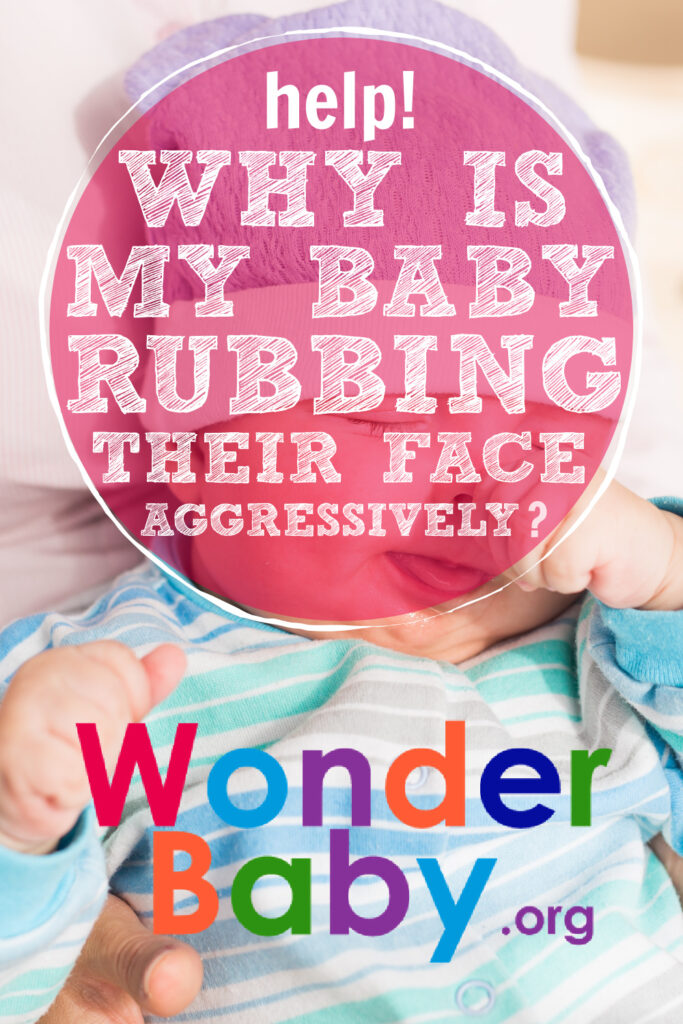
The information WonderBaby provides is not intended to be, and does not constitute, medical or other health advice or diagnosis and should not be used as such. Always consult with a qualified medical professional about your specific circumstances.
Related Posts

Eye Conditions and Syndromes, Visual Impairment
Neuralink Announces Plans to Restore Sight to the Blind with Brain Chip
Elon Musk’s company Neuralink has announced plans to begin human trials of its new “Blindsight” brain chip by the end of 2025.

Health & Nutrition
Can Baby Skin Care Products Expire?
Is that forgotten tube of diaper rash cream still safe to use? Learn more about the expiration dates of popular skin care products for infants.

Health & Nutrition
Boosting Immunity in Kids: 3 Tips for a Healthy Winter
Parents can help boost their kids’ immunity during cold and flu season by maintaining healthy eating, sleeping, and exercising habits in the winter.